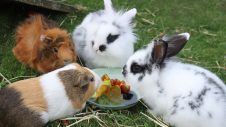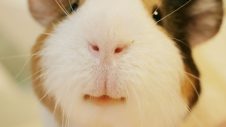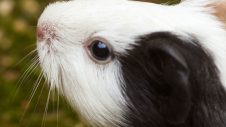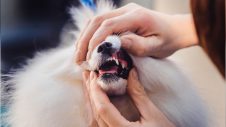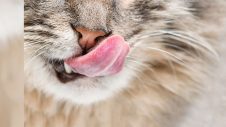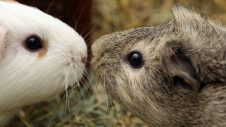Do rabbits and guinea pigs make good pets?
Rabbits and guinea pigs make excellent pets when you’ve got less space (but more love) to give. They’re notoriously clean animals and believe it or not, rabbits can be litter trained just like cats. That means your pocket pal can enjoy time to roam the house, just as long as you keep an eye on them around any possible dangers or loose items like cables and power cords.
Nutrition
Rabbits and guinea pigs are plant-eaters or ‘herbivores’ and require an adequate intake of vegetables, fruits, pellets, and fibrous grass and hay. However, rabbits are classed as ‘lagomorphs’ while guinea pigs are classed as ‘rodents’. This means the dietary requirements of a rabbit differs slightly from that of a guinea pig. While rabbits produce their own vitamin C, guinea pigs can’t, so a diet including adequate amounts of vitamin C is essential. It is safe for your guinea pig to consume rabbit food and vice versa, which is why you’ll often find rabbit and guinea pig pellets blended in the same product at your local pet store. Just make sure the food you select is nutritionally complete and high quality.
Fruits and vegetables provide high levels of vitamins and minerals. You can safely treat your rabbit or guinea pig to the following:
- asparagus
- basil
- broccoli
- brussels sprouts
- cabbage
- carrots and carrot tops (as a rare treat – they are high in sugar)
- cauliflower leaves and stalks
- celery
- chicory
- coriander
- cucumber
- dandelion (only small amounts – it can make them go to the toilet more often)
- dill
- kale
- parsley
- parsnip
- radish
- red cabbage
- romaine lettuce
- rocket
- salad peppers
- savoy cabbage
- spinach
- turnips
- tomato
- watercress
- zucchini
What to avoid:
- potato and potato tops
- rhubarb (including the leaves)
- tomato leaves
- too much fruit (as fruits are high in sugar)
Limit your rabbit or guinea pig’s vegetable intake to a variety of two to three different greens each day. This will reduce the chance of an upset tummy while promoting healthy teeth.
If your rabbit or guinea pig does not have enough to gnaw on, dental problems can occur. Teeth may become overgrown, causing significant health issues in your pet.
Dental health
Have you ever wondered why your guinea pig or rabbit is always gnawing on something? Rabbits and guinea pigs have teeth that constantly grow throughout their life. Their diet is an essential part of controlling this growth and maintaining that beautiful smile. Biting, chewing, gnawing and grinding of food will help keep your rabbit or guinea pig’s teeth at a healthy length. Specially designed dental treats and toys can also assist in healthy mouth maintenance.
It is vital that rabbits and guinea pigs are fed a nutritious diet to aid in keeping those upper and lower incisors strong, healthy, and trimmed. Your rabbit or guinea pig’s dental hygiene is essential to their health and wellbeing.
Basic care guide
Food and water
Like all of us, rabbits and guinea pigs need access to fresh water daily. Specially designed bottles can aid in maintaining a hygienic water supply. Make sure you regularly clean their food and water dishes, and that your pet is being fed a varied, nutritious diet. Speak to your Greencross Vets for any nutritional advice for your pocket pal.
Shelter
Your pet will require a large hutch with adequate shelter and warm places to hide and sleep. Or, rabbits can actually be house-trained similarly to cats. Ensure you clean your rabbit or guinea pig’s hutch twice weekly, keeping it free from droppings and replacing straw bedding regularly. All pet’s need plenty of space to stretch and exercise. Make sure you let your pet out to play every day, keeping a close eye on them and any surrounding dangers.
Move your pet’s hutch out of the sun when it’s hot, and even supply a frozen water bottle wrapped in a sock or towel on especially hot days. You should bring your pet inside in the winter months, or ensure their cage is well insulated and covered at night. Smaller animals are more prone to feel the seasonal extremities.
Socialisation
Rabbits and guinea pigs are very social animals and would really benefit from the company of a friend. Just make sure you know exactly what sex your pet is, or get them desexed. They don’t say ‘breed like rabbits’ for nothing! Speak to your Greencross Vet for more information on desexing your rabbit or guinea pig. Click here for information on how to identify the sex of your guinea pig.
Common problems
Skin and parasite problems, such as sarcoptic mange and ringworm, are also common in rabbits and guinea pigs. This can make them very itchy and must be properly diagnosed by a veterinarian. These conditions are highly contagious and are zoonotic (can potentially infect humans). As we mentioned, dental hygiene plays a major role in the health and wellbeing of rabbits and guinea pigs, so ensure you follow proper dental health protocols. Click here for information on diseases that are common in rabbits.
Rabbits and guinea pigs need the same medical care and attention as any other furry companion. Keep them healthy and happy by booking regular health checks with your local Greencross Vet.

 Greencross Vets
Greencross Vets 